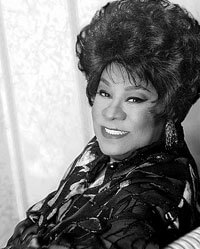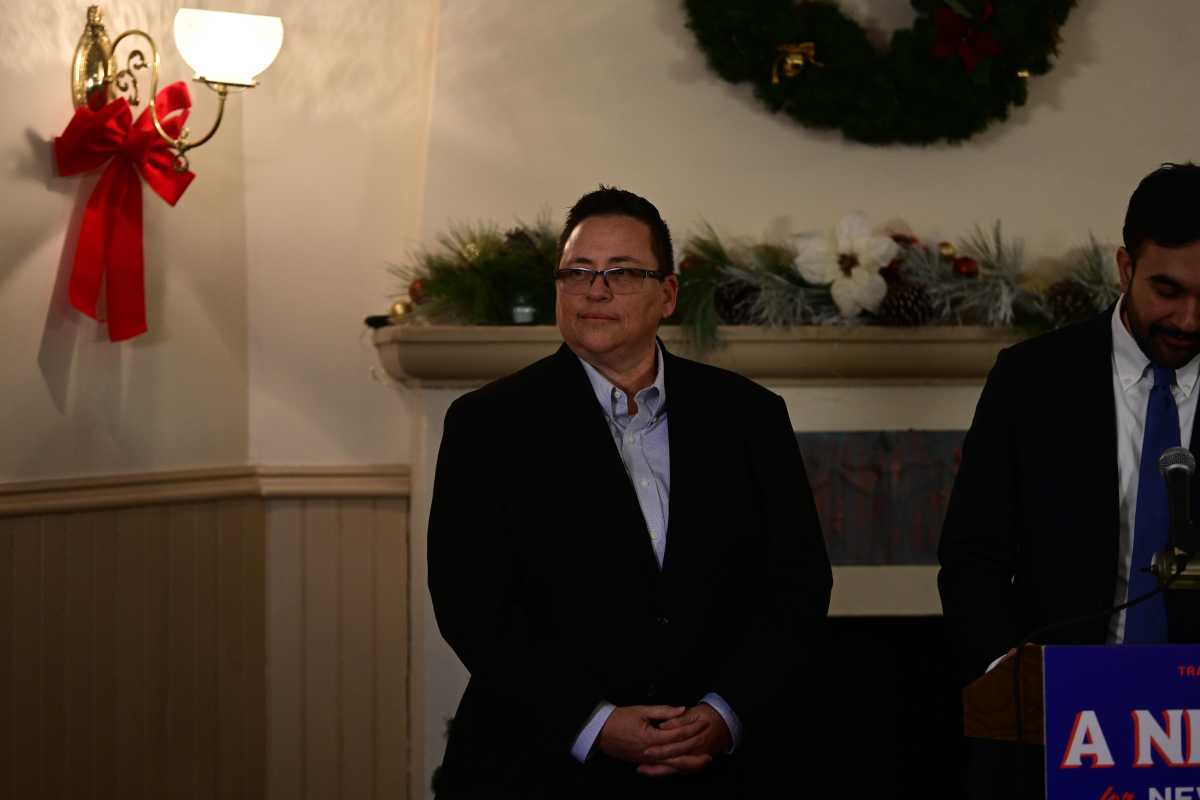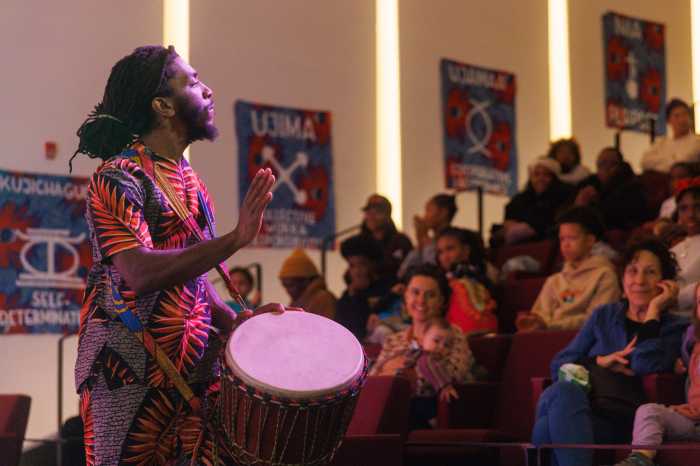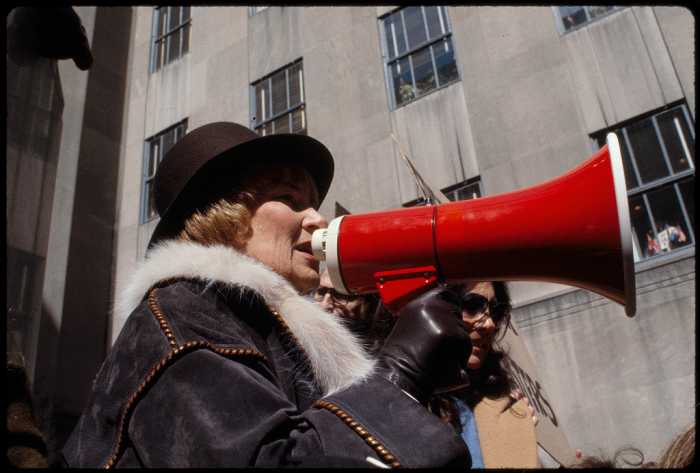Tony-winner Ruth Brown in town after five-year absence
In Las Vegas the telephone rang and rang and rang. On the fourth or fifth ring, Ruth Brown, also known as the Queen of Rhythm & Blues, once also known as The Girl With a Tear in Her Voice, picked up the phone, asked who was calling, and said, “Just a moment, let me turn the radio down.”
Girl no more. The powerhouse singer who won a Tony in 1988 as one of the stars of “Black and Blue” at Broadway’s huge Minskoff Theatre, has come back from a stroke four years ago at age 72 to open July 14, Bastille Day, at the somewhat smaller but ritzier premises of Le Jazz Au Bar on East 58th Street.
“Yes, sweetheart,” Brown said on the phone. “Back in New York for the first time in a long time. Five years.”
Were you listening to yourself on the radio?
“Yeah, that’s why it’s on,” she cheerfully admitted. “Johnny Pate, my friend, the great arranger, did the music for ‘Shaft’ and ‘Superfly’ and all that, he has a program here every Friday from 10 a.m. to 3 p.m., and the music’s just great. He asked me to I.D. the station––give the call letters, you know.”
A five-man combo at Le Jazz Au Bar will back her.
“Some things have changed. I have to apologize. I had a very bad stroke. I don’t speak very well,” Brown said, perfectly loud and clear. “Sometimes I forget the lyrics and have to read them.”
Rosemary Clooney used to do that at Rainbow & Stars in her later years.
“I know she did. She got me into Rainbow & Stars. I’ve been lucky. I’m available. I can still sing. Except I gotta sit down when I sing. My legs are not that strong,” she said, then, with a chuckle, added, “B.B. King said I deserve to sit down.”
Then, adopting a different tone of amusement, Brown continued, “Art imitates life. In ‘Black and Blue’ there was this song, ‘If I can’t sell it, I’m gonna sit down on it…”
There sure was. Ruth Brown, who back in the 50s put a struggling little outfit called Atlantic Records on the map, brought down the house on Broadway with this bawdy masterpiece by Andy Razaf and Alex Hill, night after night for months on end.
“The Tony,” she said, “yeah, I got lucky, didn’t I? I was as shocked as anybody. A good time. I don’t know how I got into that show. Somebody told me it was on the way. I didn’t think I’d make it. Nobody was hiring older people. I was so sure I won’t get it, I didn’t even bring any music or a keyboard player [to the auditions].
“They asked me to do a gospel song. I sang ‘Precious Lord.’ Then they asked me: ‘Can you do swing?’ and I think I did ‘All of Me.’ They said, ‘You’ll hear from us,’ and I said, ‘Yeah, sure, I’ll hold my breath.’ And the very next day I got a call back.
“My keyboard player, I think his name was Roland Hanna, he’s dead now, he decided I should do a real ballad. I did ‘Body and Soul’ and ended up in the show.
“We first did eight months in Paris, you know. In the same theater where Josephine Baker and everybody had performed, right there.”
Just before opening night in New York, Brown came down with pneumonia.
“Dakota Staton took my place,” she recalled. “The Daily News ran a headline: ‘Hold the Curtain Till Ruth Gets Back.’”
Pneumonia was a can of corn for the woman who had raised two sons alone, working as a maid, a school bus driver, a Head Start teacher; whomped a whole new generation as Motormouth Maybelle in John Waters’ “Hairspray” in 1988; won her first Grammy Award in 1989 and finally made the Rock and Roll Hall of Fame in 1994.
Also the woman who, on the road in 1954, had had an X-ray in Chattanooga, Tennessee, for what was thought to be an uterine tumor. “A tumor?” said the examining doctor, X-ray in hand. “Let me show you a picture of this tumor.” It was a fetus — her firstborn.
Also the woman who, six years before that, at age 19, spent 11 months in the hospital after a Chester, Pennsylvania, automobile accident while driving with Cab Calloway’s sister, who was young Ruth’s manager, on the way up to a first appearance at the Apollo Theater in Harlem.
“That’s when Atlantic Records signed me, right there in that hospital,” Brown recalled. “Duke Ellington and Willis Conover told them about me. First they sent a guy named Blackie, I think, and then Herb Abramson and Ahmet Ertegun came to see me. They brought me a pitch pipe and a book to learn to read music––which I never did.”
Brown also recalled the stroke that took her out of play for a while.
“Every year Joe Williams had a scholarship show for kids out here in Nevada,” she said. “When he passed, his wife asked me to step in. I did the show that night at Community College in Las Vegas, and in the morning I had to go to my doctor’s for an exam.
“I was driving back home, and my son Earl was sitting next to me. I told him I wanted to stop at a Jack-in-the-Box for a sandwich to take my medicine with. He said: ‘Mom, we’ll be home in 15 minutes,’ but I still wanted my sandwich. I stopped the car, moved over to the other side, got in, locked the door — and it hit me, right then.
“Pins and needles––terrible. My hands couldn’t stop shaking. I couldn’t talk. My son took me right to the hospital, the Desert Inn Hospital. I was there almost a month, in and out, in and out.
“I was so disappointed. Thought I’ll never be able to sing again. What in the world am I going to do? I never thought of killing myself, but I was so depressed,” said the woman whose deeply religious father was choir director of the Emmanuel AME Church in Portsmouth, Virginia.
“My son, my baby son”––Earl Swanson, 46, younger brother of Ronald Jackson, her other son––“came to the house to see me every day, every day, every day. I’d just be there, watching television, watching the news, all the sad things.
“He’d say: ‘Ma, why don’t you listen to your music?’ but I didn’t want to do it. He brought in radios and everything. Then he dug out all these pictures of me performing, of me at the White House, of me and Lena Horne, Miles Davis, Chuck Berry, Joe Williams, B.B. King, Duke Ellington, Ray Charles––Ray Charles! I’ve been crying about him for a week, oh my God… Well, I looked at those pictures of all the people I’d been up on stage with… I didn’t do too bad,” she said, the glee leaking into her voice even over the telephone lines.
That’s when she’d started singing again.
Yes, confirmed Ruth Brown, born Ruth Weston, January 30, 1928, oldest of the seven children of Leonard and Martha Alston Weston. She outlived three of her husbands.
“Willis Jackson, a saxophone player. Earl Swanson, a saxophone player. And Bill Blunt, a peace officer,” Brown said.
“Wait a minute! I forgot! When I ran away from home as a young girl, I married the guy I ran away with, a ship man named Jimmy Brown. That’s where the Brown comes from. I only learned Jimmy Brown was still alive this year. If I’d come home unmarried, my father would have dug my grave and put me in it.
“My father had probably the best tenor-to-baritone voice I eve heard. He was a laborer on the docks. My mother worked in restaurants and that kind of thing.
“When I started singing what was called the devil’s music, they weren’t too pleased. Until the year I came home from being on the road doing comedy with Joe Louis, after he lost to Ezzard Charles. I came home with Joe Louis, and my father like to died.
“So now?” repeated the woman on the other end of the telephone. “Now I’m delighted to be hanging in here this long.
“Any day above ground is a good day,” said Ruth Brown. “Call again if you like.”
And in all likelihood she went to turn the radio back up to hear a bit more of herself on Johnny Pate’s Friday show in Las Vegas, Nevada.


































